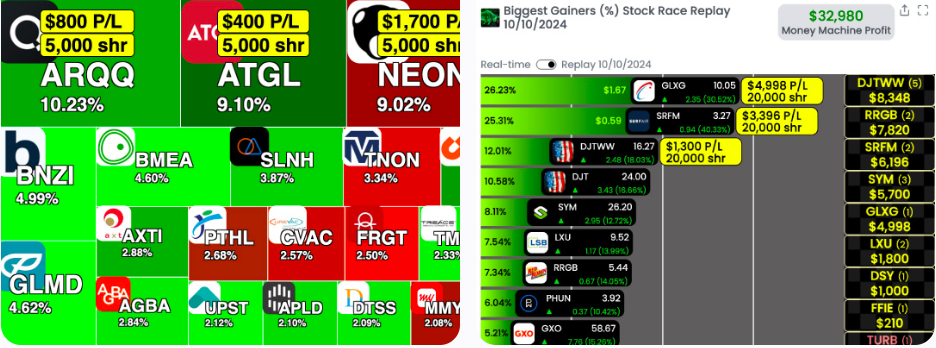20 New Reasons For Picking AI Stock Picker Analysis Sites
20 New Reasons For Picking AI Stock Picker Analysis Sites
Blog Article
Top 10 Tips To Help You Evaluate The Cost And Price Of Ai Trading Platforms That Forecast Or Analyze Price Of Stocks.
To obtain the most value for your money it is essential to evaluate and price AI stock predicting/analyzing platforms. Pricing structures can differ widely, and understanding the value you're paying for is crucial to making an informed decision. Here are 10 tips to help you evaluate the price and value of these platforms.
1. Understand the Pricing Model
Subscription-based platforms: Discover whether you are required to pay a monthly or yearly cost. Also, learn the features included with each level.
Pay-per-use: Find out whether the platform charges you according to usage (e.g. the amount of data requests, trades or forecasts).
Freemium: Check the extent to which a platform provides the free version that is limited and adds additional charges to access premium features.
2. Compare Pricing Tiers
Comparing the features included in each price range (e.g. basic professional, professional, and enterprise).
Scalability: Ensure the pricing tiers are in line with your requirements, whether you're an individual trader professional, or an institutional member.
Upgrade flexibility: Check whether it's feasible to upgrade or downgrade the plan when you alter your requirements.
3. Evaluate Hidden Costs
Data fees are a matter of fact. Find out if you are required to pay to access premium data.
Brokerage fees: Find out whether the platform charges extra fees for trade execution or integration with brokers.
API use: Find out if you are liable for additional charges due to high-frequency API usage or API access.
4. Demos and Free Trials, and Test Drives
Trial period - Search for websites that offer a demo or free trial so you can try out the features before you commit.
Review the restrictions on the free trial. It may not include all of its features.
Choice of no-commitment: Be sure you're able to end the trial at any time should it not meet your requirements.
5. Find the most recent discounts and offers
Annual discounts: Find out whether the platform offers discounts for annual subscriptions compared to monthly plans.
Referral programs: Find out whether you can earn discounts or credits for referring others to the platform.
Ask about bulk or institutional pricing if your company is large.
6. How do you assess return on investment (ROI).
Cost vs. Value: Find out if the features and predictions of the platform justify its price. Can it, for instance aid you in making a better decisions in trading or help you help you save time.
Performance track record: Look at the platform's rates of success or user feedback to get an idea of its ROI potential.
Alternative costs: Compare the platform's cost to the cost that could be incurred by not making use of it (e.g. missed opportunities, analysis time manually).
Review Policies on Cancellation and Refunds
Terms of Cancellation: You are able to cancel your contract without any hidden fees or penalties.
Check the policy on refunds to see what you can claim as the refund you need for unredeemed subscription portion.
Auto-renewal: Determine whether the platform auto-renews your subscription and how to decide to stop it.
8. Price transparency is important
A clear pricing page - Make sure there are no additional fees that are not mentioned on the pricing page.
Customer service: If you have any questions about pricing or extra costs Contact customer service.
Contract terms: Make sure you are aware of the terms of service and any fines.
9. Compare with Competitors
Check out the features and prices on various platforms to find the most value.
User reviews: Read user feedback and find out if other users think this platform is worth it.
Market positioning: Examine the pricing and decide if you are getting a platform that is in line with your expectations.
10. Consider the Long-Term Costs
Price increases: Look at the history of the platform in the past and see how frequently it raises prices.
Feature additions: Assess if new features are included in your current plan or need to be upgraded.
Scalability costs: Make sure the pricing of your platform is fair, as you increase your trading or data requirements.
Bonus Tips
Trials for free on different platforms are available to test and evaluate the benefits and performance of different platforms.
Offer prices to negotiate: If you have a large number of customers or are part of an organization, ask for special pricing and discounts.
There are numerous platforms that provide educational resources and tools no cost.
If you follow these guidelines, you'll be able to evaluate the costs, pricing, and features of AI stock trading platforms. A balanced platform can provide you with the best of both worlds: affordability and functionality. See the top ai investing app for website recommendations including investing ai, options ai, chart ai trading assistant, ai stocks, options ai, ai for stock predictions, best ai stock trading bot free, ai investment app, ai for trading, ai for trading and more.
Top 10 Tips For Assessing Regulatory Compliance With Ai Stock Predicting/Analyzing Trading Platforms
The regulatory compliance aspect plays an important role in evaluating AI platforms to predict stock prices and analyze. Compliance helps to ensure that the platform is operating within the legal frameworks and safeguarding the privacy of users. Here are the top ten tips to assess the regulatory compliance of these platforms:
1. Check your license and registration
The regulatory bodies: Make sure the platform has been licensed and registered with the relevant financial regulatory authorities (e.g. SEC in U.S.A., FCA UK, ASIC Australia).
Verify that brokers who are included in the platform are licensed and licensed and.
Public records: Go to the regulatory body's website for the status of registration for the platform and any past violations.
2. Assess Data Privacy Compliance
GDPR - If your platform is located in the EU and/or provides services to users in the EU make sure that it complies with GDPR.
CCPA – For Californian users Check compliance with California Consumer Privacy Act.
Data handling policies: Review the platform's data privacy policy to ensure it outlines the methods by which data from users are collected as well as how it is stored and transferred.
3. Examining anti-money laundering measures
AML Policies The platform should be equipped with strong AML (Anti-Money Laundering) policies that detect money laundering and stop it.
KYC procedures: Check if the platform uses Know Your Customer (KYC) which validates user identities.
Transaction monitoring: Find out if your platform monitors all transactions for suspicious activity and reports them to the authorities.
4. Check for your compliance with Trading Regulations
Market manipulation: Check that the platform has measures in place to prevent manipulating the market, for example, spoofing and wash trading.
Types of orders: Make sure that the platform is in compliance with the rules governing the types of orders (e.g. no stop-loss that is illegal to hunt).
Best execution: Make sure the platform follows the best execution practices, making sure that transactions are executed at the best available price.
5. Cybersecurity Assessment
Data encryption. Ensure your platform uses encryption of user data both in rest.
Response to incidents: Verify that the platform has a plan for incident response in place to deal with cyber-attacks or data breaches.
Certifications - Check to see if your platform has any cybersecurity certifications.
6. Transparency and Disclosure: A Review
Fee disclosure: Make sure the platform clearly outlines all fees, including extra or hidden charges.
Risk disclosure: Check if there is a clear declaration of risks, specifically for high-risk or leveraged trading strategies.
Performance reporting: Check if the platform provides clear and accurate reports on performance for its AI models.
7. Check for the compliance of international regulations
Cross-border trading When you conduct business internationally, make sure the platform meets rules in all the jurisdictions relevant to you.
Tax reporting - Check whether a platform offers tools and reports that assist users in complying with tax regulations.
Compliance with international sanctions: Be sure the platform adheres strictly to these rules and does not allow transactions between prohibited countries or entities.
8. Assess record-keeping and audit trails
Transaction records: To meet regulatory and auditing reasons, make sure that the platform keeps full logs of each transaction.
User activity logs - Make sure that the platform logs every user's activity, including logins to the platform, trades executed, and any changes to account settings.
Audit readiness: Make sure that the platform can provide all necessary documents and logs in the event of a regulatory audit occurs.
9. Check for the compliance of AI Specific Regulations
Algorithmic trading rules: If you are using a platform that supports algorithmic trading ensure that it is in compliance with relevant regulatory frameworks like MiFID II or Reg SCI in Europe as well as the U.S.
Fairness and Bias: Make sure that the platform detects and reduces biases within its AI models in order to ensure fair trading.
Explainability - Make sure that the system is able to give clear and concise explanations regarding AI-driven predictions, decision-making, etc. in accordance with certain regulations.
10. Review the User's Feedback and the Review Regulatory History
User feedback: Read user reviews to assess the credibility of the platform in terms of compliance with the law.
Review the regulatory history to see whether there have been any violations to the rules of regulation that have been committed, and also fines and penalties.
Third-party audits: Determine whether the platform is subject to regular audits by third parties to ensure compliance with regulations.
Bonus Tips
Legal consultation: Consult an expert in the field to check whether your platform is compliant with the regulations.
Trial period: Take advantage of a no-cost demo or trial to assess the compliance features available on the platform.
Customer Support: Verify that the platform has assistance to customers with any questions or issues related to compliance.
Utilizing these suggestions using these tips, you will be able to assess the degree of compliance with the law between AI stock trading platforms. This allows you to select a platform which is legal and protects your interest. Compliance reduces legal risk and builds trust on the platform. View the top next page for best ai penny stocks for website recommendations including ai in stock market, best ai stocks, best ai stock prediction, ai stock prediction, ai copyright signals, stock predictor, best ai stocks, free ai tool for stock market india, best ai stocks, stock trading ai and more.